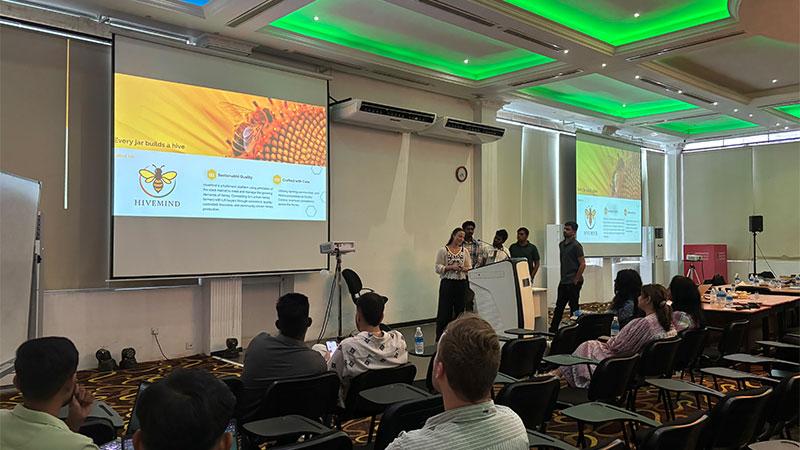Students from the University of Westminster’s School of Organisations, Economics and Society (SOES) have visited Sri Lanka to take part in the Rethinking Invisibility of Global South Brands hackathon, a collaborative initiative between Westminster and the Informatics Institute of Technology (IIT) Colombo. The hackathon brought together students from both institutions to tackle pressing global challenges through technology, entrepreneurship and cross-cultural teamwork.

This year’s challenge centred on raw honey, a product that often struggles to stand out in global markets because brands from the Global South often struggle to tell their own stories, as the power to create and control branding mostly sits in the Global North. This means that Global South producers often do not benefit fully from the value they create and their voices are missing from how their products are presented. To tackle this problem, the hackathon challenged students to create apps for small honey producers from the Global South to enhance their branding and narratives as well as improve the global understanding of how the product is sourced, empowering all involved.
As part of the bootcamp, students participated in a series of dynamic activities to bring their apps to life. They joined collaborative app development workshops with IIT Colombo students, where they co-designed digital solutions to address the issue of adulterated honey in global trade. Five mixed UK and Sri Lankan teams worked creatively together to develop five new start-up ventures, each offering a unique approach to ethical honey sourcing, supply chain transparency and tech-enabled storytelling. Teams then prepared and delivered final pitches to a panel of local entrepreneurs and mentors and gained valuable feedback and experience in presenting ideas in an international context. The teams were led by Ashton William Brown, Abigail Bell, Benyamin Davari, Sophie Cichero and Henrik Okholm. Three of the teams are now set to take their ideas forward.

The teams were guided by Jiehfeng Hsu and Asini Silva from IIT, and Rathesan Sivagananalingam oversaw the project as the IIT’s academic counterpoint.
Alongside the project work, students took part in cultural immersion activities, including visits to Colombo’s bustling markets and temples, and evenings listening to traditional storytelling that deepened their appreciation of local values and heritage. They also visited Hatch Colombo, one of the country’s leading innovation hubs, which offered insight into how start-up culture in Sri Lanka compares to the UK.
The trip concluded with reflection and feedback circles, where students explored their personal growth, team dynamics and the impact of the experience on their understanding of entrepreneurship, ethics and global collaboration.
About the experience Abigail Bell said: “The bootcamp threw us into the unknown - into unfamiliar culture and new teams. It wasn’t neat or predictable but it was certainly transformative. We weren’t just building an app, we were figuring out how to work across cultures, how to lead when you’re out of your depth and how to build something meaningful under pressure. It was intense, eye-opening and an experience that challenged my approach to what business and technology looks like.”
Deborah Rose, who led the initiative along with Gayani Fernando, said: “This bootcamp was a powerful experience for both colleagues and students. It brought together two cultures to explore real-world problems through technology, entrepreneurship and empathy. Students didn’t just build an app, they engaged deeply with issues like food fraud and the invisibility of Global South producers. What emerged was not only a working prototype, but a meaningful experience in collaboration, creativity and global thinking.”
She added: “This work is about expanding who gets to innovate, create value and be heard, building systems where knowledge and opportunity circulate more justly, for everyone. When we widen access to innovation, value creation and voice, we don’t just empower the margins, we redesign the centre to reflect the whole.”
This initiative directly contributes to the United Nations Sustainable Development Goals (SDG) 8: Decent Work and Economic Growth and 17: Partnerships for the Goals. Since 2019, the University of Westminster has used the SDGs holistically to frame strategic decisions to help students and colleagues fulfil their potential and contribute to a more sustainable, equitable and healthier society.
Find out more about the School of Organisations, Economics and Society at the University of Westminster.









